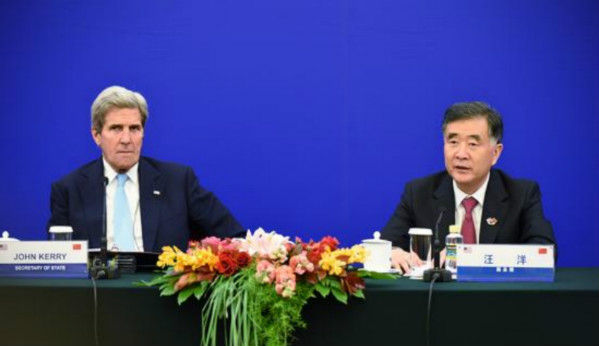Differences should not be excuse for confrontation
(China Daily) Updated: 2016-06-08 07:18
 |
|
Closing ceremony of Sino-US Strategic and Economic Dialogue.[Photo/Chinanews] |
From the international supply glut to currency policy to the South China Sea and the Democratic People's Republic of Korea, United States envoys to the annual Sino-US Strategic and Economic Dialogue conveyed a fairly long list of concerns on which they believe China's actions are crucial.
Which left their Chinese counterparts frustrated because their US guests had either misread Chinese intentions, or failed to appreciate the efforts being made.
This is more than natural, considering the lack of trust between Beijing and Washington.
But that is precisely why the Dialogue, along with dozens of similar mechanisms, came into being and has proved instrumental in managing the sometimes capricious bilateral relationship.
Like the Chinese and US militaries' attempts to manage unexpected encounters and prevent unintended conflicts, the Dialogue has become a crucial platform for both sides to air their dissatisfactions, compare notes, and clear up misunderstandings.
As Chinese President Xi Jinping said at the opening of the Dialogue, since divergences are inevitable even among family members, it is the approach to them that ultimately matters.
"What is important is to refrain from taking differences as excuses for confrontation," Xi said.
US Secretary of State John Kerry, who led the US delegation, concurred, saying it is "absolutely vital" to work constructively on differences.
The pains both Beijing and Washington have taken to create a favorable atmosphere for the Dialogue in Beijing were assuring signs that they know the significance of the talks being constructive.
And despite their abundant differences, they did get closer to some otherwise unachievable consensuses regarding such very thorny issues as excess capacity and currency policy.
If we saw a shared interest in pacifying the once tense relations between the countries' militaries in Singapore the other day at the Shangri-La dialogue, we saw the reason and restraint displayed there paying off in Beijing.
As Kerry said, the Dialogue offered an opportunity for seeking creative ways to narrow or eliminate differences. It was the common political will that worked the magic.
Calling climate cooperation "one of the strongest pillars of our relationship", Kerry voiced the hope that the same spirit of compromise could extend to other areas of disagreements.
We have seen it at work, delivering the more than 160 achievements the Chinese government identified.
But we need to see it in the two countries' handling of other differences, especially on the South China Sea issue.
The climate agreement was a tremendous success. But Beijing and Washington can achieve a lot more when they get constructive in dealing with each other.

I’ve lived in China for quite a considerable time including my graduate school years, travelled and worked in a few cities and still choose my destination taking into consideration the density of smog or PM2.5 particulate matter in the region.











